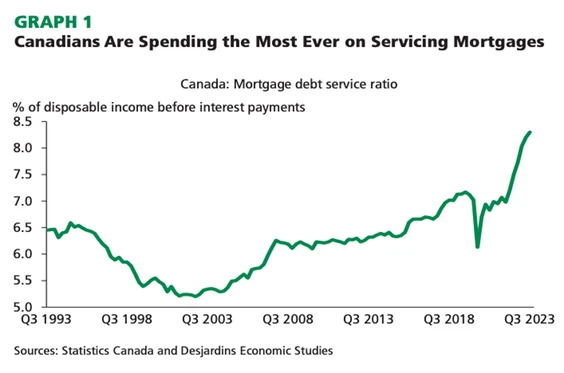
This could be the darkness before the dawn.
After almost two years of punishing interest rate hikes and high inflation, Canadians’ attitudes about their debt sank to its lowest level in the most recent MNP Consumer Debt Index.
“Canadians’ current debt perception has reached an all-time low, with the impact of inflation and higher interest rates leaving them feeling the most pessimistic about their current debt situation,” said the insolvency firm’s quarterly survey.
According to the poll, 63 per cent of respondents are concerned about their ability to repay their debt. In a separate survey by Nanos, half of Canadians said they were worried about making their mortgage payments.
“The added pressure of holiday bills coming due, mortgage renewals approaching, costs continuing to increase, and you can see how many Canadians could be approaching a crisis point both mentally and financially,” said Grant Bazian, president of MNP Ltd.
Relief will come. The Bank of Canada paused rate hikes in September, and many economists believe that’s it for this cycle. But when rates will start to ease and by how much is another question.
Optimism soared at the end of 2023 that this would happen sooner rather than later, but the new year has brought a “sober reassessment of rate cut prospects,” said BMO chief economist Douglas Porter.
Jobs data out Friday showed inflation concerns aren’t gone yet. Wage growth accelerated to 5.4 per cent, two percentage points higher than overall inflation and “far too hot for the Bank of Canada’s comfort,” he said.
A “flash of strength” in the housing market in December could also be an unwelcome reminder to the central bank of last spring’s rebound.
“That short-lived revival in housing activity was probably a key factor in pulling the Bank off the sidelines and back into the tightening game, so we are highly sensitive to signs that housing may be stirring,” said Porter.
All Canadians can do is wait, but that wait is becoming increasingly painful.
Canada’s household debt is the highest in the G7 and the latest data show that Canadians are putting a record amount of their disposable income toward servicing debt, most of it from rising mortgage payments.

The number of Canadians opting to just make the minimum payments on debt has jumped over the past two years, says MNP. Twenty-six per cent said they just pay the minimum on their credits cards, up five percentage points from 2021.
Eighteen per cent say they have borrowed money they can’t afford to pay back quickly, up seven percentage points from two years ago.
Another worrying sign is that Canadians are finding their finances stretched just to get by. One in five say they have needed to take money from home equity or registered savings plans to make debt payments or day-to day expenses, the MNP poll found.
“Put simply, most things cost more, debt repayment costs more and that leaves more feeling pessimistic about paying off debts, making ends meet and about their financial futures on the whole,” said MNP’s Bazian.
Comments are closed.
